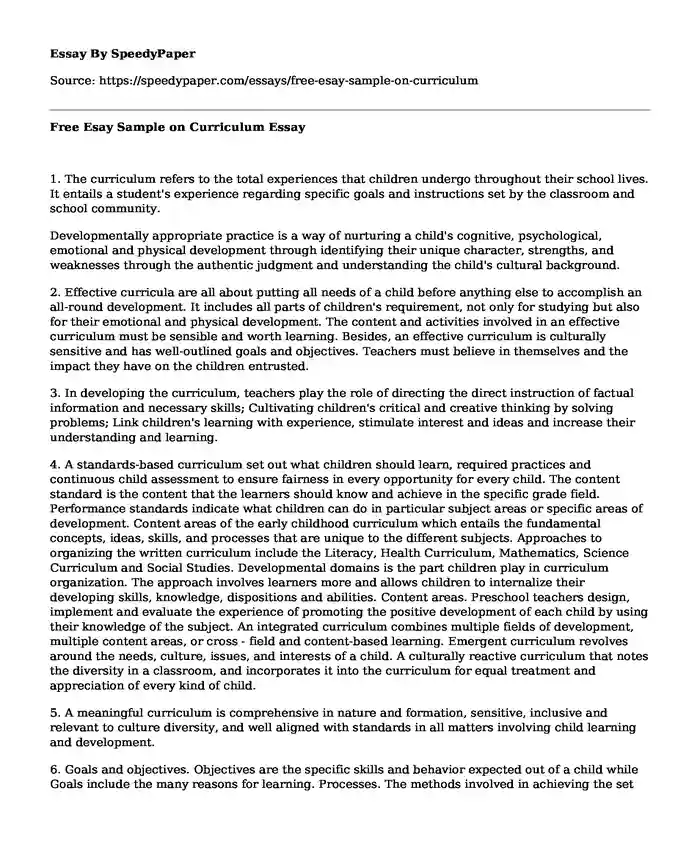1. The curriculum refers to the total experiences that children undergo throughout their school lives. It entails a student's experience regarding specific goals and instructions set by the classroom and school community.
Developmentally appropriate practice is a way of nurturing a child's cognitive, psychological, emotional and physical development through identifying their unique character, strengths, and weaknesses through the authentic judgment and understanding the child's cultural background.
2. Effective curricula are all about putting all needs of a child before anything else to accomplish an all-round development. It includes all parts of children's requirement, not only for studying but also for their emotional and physical development. The content and activities involved in an effective curriculum must be sensible and worth learning. Besides, an effective curriculum is culturally sensitive and has well-outlined goals and objectives. Teachers must believe in themselves and the impact they have on the children entrusted.
3. In developing the curriculum, teachers play the role of directing the direct instruction of factual information and necessary skills; Cultivating children's critical and creative thinking by solving problems; Link children's learning with experience, stimulate interest and ideas and increase their understanding and learning.
4. A standards-based curriculum set out what children should learn, required practices and continuous child assessment to ensure fairness in every opportunity for every child. The content standard is the content that the learners should know and achieve in the specific grade field. Performance standards indicate what children can do in particular subject areas or specific areas of development. Content areas of the early childhood curriculum which entails the fundamental concepts, ideas, skills, and processes that are unique to the different subjects. Approaches to organizing the written curriculum include the Literacy, Health Curriculum, Mathematics, Science Curriculum and Social Studies. Developmental domains is the part children play in curriculum organization. The approach involves learners more and allows children to internalize their developing skills, knowledge, dispositions and abilities. Content areas. Preschool teachers design, implement and evaluate the experience of promoting the positive development of each child by using their knowledge of the subject. An integrated curriculum combines multiple fields of development, multiple content areas, or cross - field and content-based learning. Emergent curriculum revolves around the needs, culture, issues, and interests of a child. A culturally reactive curriculum that notes the diversity in a classroom, and incorporates it into the curriculum for equal treatment and appreciation of every kind of child.
5. A meaningful curriculum is comprehensive in nature and formation, sensitive, inclusive and relevant to culture diversity, and well aligned with standards in all matters involving child learning and development.
6. Goals and objectives. Objectives are the specific skills and behavior expected out of a child while Goals include the many reasons for learning. Processes. The methods involved in achieving the set goals and objectives as teachers understand their learners better. Activities and lessons, that involved combined and continuous formulation of learning experiences by the teachers and their children, to meet the set goals, outcomes and objectives. It can help children to know the knowledge better and better. Assessment. The criteria applied to measure the accomplishment of outlined objectives. Differentiation. Adapting to various activities to reach different learners depending on the weaknesses and strengths noted after assessment.
7. Plan for children needs based on their age, background, uniqueness, and abilities to be able to reach every child separately. Content planning enables the teacher to define and distinguish every area of learning, and present it in the most suitable way possible for every child to understand. The teacher plans various methods and experiences to maximize learning, meeting all requirements of the diverse learners. Selecting appropriate methods of assessment gives way to better plans. A teachers plan includes assessing his or her learners to know their progress. Reflection guides a teacher to make better plans for better results. Finally, a teacher must always plan to curb future challenges and make better outcomes out their children.
8. Long-term is planning that serves a framework for later planning efforts. It includes yearly, semester, or quarterly planning, and thematic unit or project planning. It prepares the teachers and parents on what they require and expect for earlier preparation. Planning for daily or weekly learning experiences is called short-term planning. The short-term plan is more specific and detailed than the long-term plan because it solves the daily decisions you will make as a teacher.
9. Assessment is the process of determining the progress and understanding of a child by continually observing and recording the degree of success in the activities carries out in during study. Observation. Keen note of the weak points and successes of kids through checklists, interviews, anecdotal records, rating scales, surveys, and questionnaires. Test, defined as a sample of behavior in a particular area or domain, reading readiness, mathematics achievement. Performance assessment: In performance assessment, learners' abilities get assessed as they produce work of their own by drawing upon their knowledge and skills, considering the context, and responding to a task.
10. Documenting and supporting children's learning, Administering, scoring and interpreting children results, both short-term and long-term, and involving children and families in assessment. The teacher's assessment determines the progress of the child. It also gives way to identifying the ways to help the child do better in every activity.
Cite this page
Free Esay Sample on Curriculum. (2022, Apr 06). Retrieved from https://speedypaper.com/essays/free-esay-sample-on-curriculum
Request Removal
If you are the original author of this essay and no longer wish to have it published on the SpeedyPaper website, please click below to request its removal:
- Using Wikipedia as a Source - Free Essay for Students
- Essay Sample in History: Latin American Revolutions
- Literary Essay Example
- Healthcare Essay Sample: Factors Affecting the Implementation of the Call Bell System
- Free Essay Example: Crisis Leadership Phases and Challenges
- Free Essay Comprising a Business Ethics Program
- Essay Sample on Pacquiao vs. Mayweather: Fight of the Century
Popular categories





